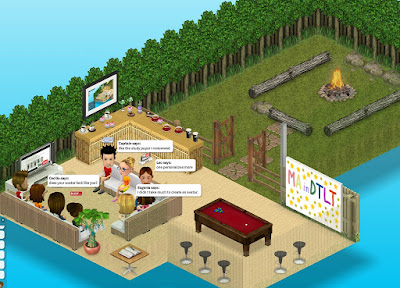Game Decisions
Game Decisions
Cozy games are games that evokes the fantasy of safety, abundance and softness. A cozy game has no risk, nothing you do will have any dramatic repercussions. There is an abundance of all your basic needs (food, shelter etc.). The player is relaxed as they're in a low-stress environment but may still be highly engaged in the game.
People like Cozy games because it allows them to experiment in a world they never could in real life without any danger or risk.
When creating a cozy game it is very easy to disrupt a players feeling of coziness due to common game mechanics.
Factors that can ruin coziness:
- Danger, fear, threat: Any sense of danger triggers responses in the player. Their nervous system kicks, adrenaline floods the body, and memory suffers. Often times, cozy spaces are presented as reprieve or refuge from these dangers.
- Responsibility: Responsibility the effort to plan, think, and the execute a plan to resolve something. Being responsible causes aa high priority need. Examples include any form of mandatory maintenance, needy pets, companions, or entities that require constant, non-optional care.
- Unpleasant distractions: Distractions such as notifications, sudden noises or nagging remove a player’s autonomy over their focus. Their agency around being able to explore and appreciate a game in their own way is lost. Distractions also demand attention, generating a need.
- Intense stimulus: Anything sudden, disproportionately bright or loud, or invasive/proximal can diminish the feeling of coziness.
- Distance: Vast spaces eliminate a sense of safety by being unknowable. However, it is still possible to create very subtle or natural thresholds that establish a cozy space within the context of something broad: like a campfire in the middle of a wood.
- Phobia sources: Anything commonly associated with a phobia, such as spiders, guns, or knives, can suggest harm or threat. This can be mitigated by context: for instance, the presence of a knife in order to cook or perform other nurturing activities, especially if it cannot be used for violence.
- Non-consensual social presence: Anything non-consensual removes a player’s feeling of safety, but this is especially relevant in social situations. An uninvited presence can feel threatening, or just suggest an unsought expectation of interaction, reciprocation, or responsibility.
- Confinement: Many small spaces are considered cozy since you can quickly inspect them to see if you are safe. But, this sort of coziness requires choice, and in turn inescapable small spaces can instead be seen as claustrophobic and controlling. A prison cell is generally not cozy.
- Deception, betrayal, lies, insincerity: These forms of social masking create doubt and apprehension about social interaction, turning them from fulfilling and need-satisfying experiences into threatening and dangerous ones.
- Opulence, pretentiousness, “fanciness”: Most cozy spaces veer somewhat more mundane than pretentious or opulent. On the one hand, fanciness can often create social comparison pressure, or come off as insincere, diminishing social safety. On the other hand, most opulence lacks the familiarity that often contributes to a feeling of safety.
Coziness overlaps with many different themes and aesthetics but are not specifically cozy. These are:
- Cutness, just because something is cute doesn't mean it's cosy. Some cute monsters can be threatening.
- Childlike, childlike games are often safe but lack the focus on high level needs.
- Smallworld, many small world games have the same look of coziness but can have threats and danger.
- Home, homes create a sense of coziness but often needy, threatening and intense.
Cozy games are usually made up of warm tones to give the player a sense of warmth.
They relate to the players past experience, nostalgia and shared cultural language.
Ralph Koster has a theory of what "fun" is. His theory is that the fun of games comes from skill mastery.
Theory of Fun draws from the work of psychologist Mihaly Csikszentmihalyi. He studied what he called the mental state of “flow”. This is when you're in a state of extreme focus of attention, where you tune out everything except the task you’re concentrating on, you become productive, and your brain releases a shot of neurochemicals that is pleasurable..
Csikszentmihalyi identified three requirements for a flow state to exist:
- You must be performing a challenging activity that requires skill.
- The activity must provide clear goals and feedback.
- The outcome is uncertain but can be influenced by your actions. (Csikszentmihalyi calls this the “paradox of control”: you are in control of your actions which gives you indirect control over the outcome, but you do not have direct control over the outcome.)
As humans we enjoy things we're good at so games should start out easy and as we learn they should become increasingly difficult to keep us learning and interested in a game. If it's too easy we will lose interest.
 |
| Cozy Game |



Comments
Post a Comment